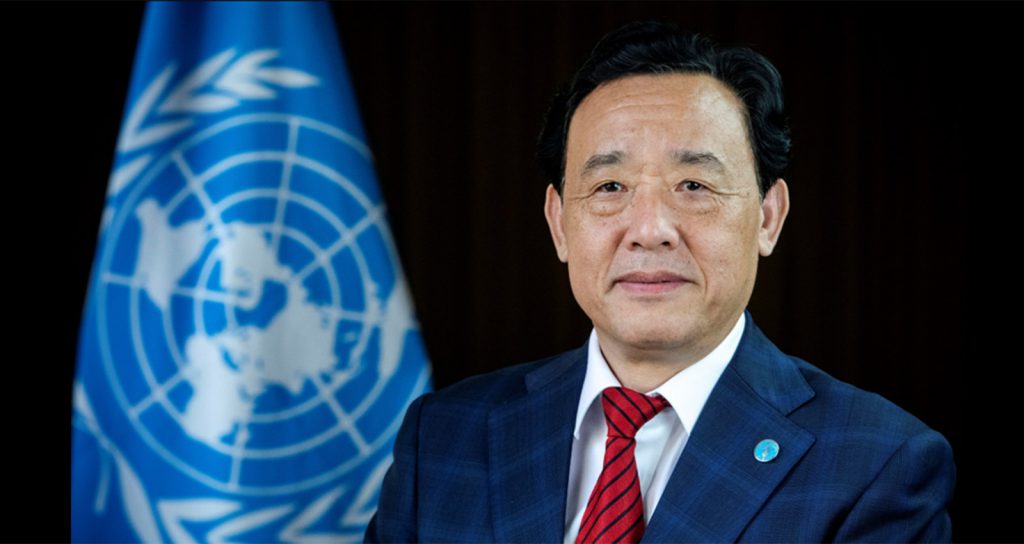China’s presence in United Nations (UN) development work has expanded considerably. While this contributes to geopolitical rivalries with the West, Max-Otto Baumann and Sebastian Haug advocate examining the potential and risks of China’s take on the UN’s role, its cooperation priorities, and development philosophy
Qu Dongyu was recently re-elected as Director-General of the Food and Agriculture Organisation (FAO), a specialised agency within the United Nations (UN) system. This directs attention to a trend that has come under increasing scrutiny: China’s expanding engagement with the UN development pillar. Since taking over in 2019, Qu has been credited with making FAO more agile through management reform and innovative partnership mechanisms, including the Hand-in-Hand-Initiative. At the same time, Qu has attracted criticism for his initial position on the war against Ukraine, which echoed Russian rhetoric, and for evading UN accountability structures.

Most observers struggle to come to terms with China’s growing engagement at FAO and elsewhere in the UN system. China is still underrepresented among UN staff. However, it has recently managed to significantly increase the number of its nationals in UN bodies. And while China’s financial contributions to the UN development pillar are still limited overall, it uses them in a targeted manner. One such usage is the UN Peace and Development Trust Fund.
Western states have become increasingly wary of China’s inroads into UN development work, traditionally one of their strongholds. The United States and European powers have watched with suspicion as China expands its South-South cooperation work with UN bodies. They have also tried to actively limit UN engagement with China’s Belt and Road Initiative (BRI).
Western states have become increasingly wary of China’s inroads into UN development work, traditionally a Western stronghold
While scrutinising China’s actions is important, debates should deal not only with geopolitical tensions but should also engage with the effects of ongoing shifts on UN policies, roles, and functions. This might contribute to a more constructive discussion on how the UN can adjust and innovate to ensure its relevance and effectiveness in a changing global context. We identify three characteristics of Chinese engagement that have implications for the evolution of the UN development pillar.
First, China approaches UN bodies as brokers or 'matchmakers' of development partnerships. FAO’s Hand-in-Hand-Initiative aims to unlock the potential of different partners’ resources and direct them to places that require external support. The matchmaking element is also at the heart of the Programme for Country Partnership at the UN Industrial Development Organisation, introduced under its former Chinese Director Li Yong (2013–2021).
China approaches UN bodies as brokers or 'matchmakers' of development partnerships, and tends to focus on economic priorities
The UN Department of Economic and Social Affairs (DESA), headed by Chinese nationals since 2007, has also taken this approach. China’s focus on matchmaking differs from the predominant Western approach to UN development work. It puts a stronger focus on bilateral relations among member states, frames cooperation as mutually beneficial, and approaches UN entities mainly as vehicles for Chinese development support schemes.
Second, China’s expertise and support elevate selected areas of UN development work, offering an alternative take on UN policy priorities. This has been particularly visible through Chinese investment in big data for development. Both FAO and DESA have recently set up multiple partnerships with China, including China-based data centres. In addition, FAO’s geospatial platform now provides the basis for a precise geographic targeting of development interventions. China has also long been a popular source of knowledge for agricultural policies and poverty reduction measures that UN entities help disseminate across the globe.
Third, China is contributing to a broader shift in the UN’s development philosophy. Compared with the holistic approach promoted by the 2030 Agenda, China’s interventions often focus on economic development and infrastructure measures.
Efforts to reach Sustainable Development Goal (SDG) 9 – on infrastructure, industrialisation and innovation – are significantly underfunded in UN portfolios. Chinese assistance practices can therefore both complement and challenge the UN’s commitment to socio-political change and its human rights-based approach. The Hand-In-Hand-Initiative, for instance, often focuses narrowly on economic wins. Project documents detail 'returns on investment' while SDG integration or human rights concerns appear at the margins, if at all.
Taken together, Chinese engagement with the UN development pillar reflects a notion of multilateralism that differs from established (Western) concepts. These concepts frame UN entities as actors in their own right, nurtured by core resources and drawing legitimacy from their neutrality. China seems to see the UN more as a platform for facilitating bilateral exchanges, thriving on individual member state contributions.
The Chinese approach could help adjust the UN to changing political realities, but brings risks for its commitment to individual and human rights
China’s approach receives low scores on conventional global governance indices. But it might well offer a mechanism for adjusting the UN to changing political realities. Beyond Chinese power and expertise, a stronger – and more explicit – focus on bilateral stakes might strengthen the UN’s relevance among an increasingly divided membership. It might also open avenues for drawing on development solutions from across the board, and overcoming outdated North-South assistance models.
However, China’s approach also comes with a major risk. A UN built more directly around states’ discrete and immediate priorities will find it difficult to maintain its commitment to individual and human rights and a long-term focus on global public goods. In line with the UN Charter, it is in the interest of all member states to ensure that the global organisation provides a stable normative foundation for multilateral cooperation.
Regardless of China's representation within UN executive positions, its engagement with the development pillar will co-shape the future of multilateralism.